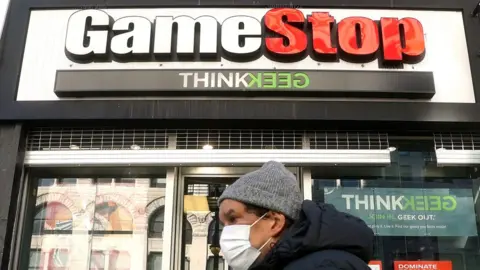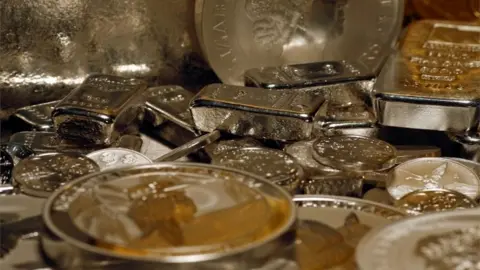GameStop - David and Goliath or a political fable?

 Reuters
ReutersTake a company that's been around for years. Think of a high street VHS video store in the age of Netflix, for example. I, a cynical financial investor, think to myself - I don't like the prospects for that company - it looks out of date, I reckon it's doomed. The shares cost £1 each - a year from now I reckon it will surely be bust.
Thanks to the way the financial markets work there is a way I can make money out of this company's seemingly inevitable demise.
I find someone who owns the shares and I borrow 1,000 of them in return for a small daily fee. I then sell the shares I've borrowed, pocketing £1,000 but I still owe the owner (I am "short") 1,000 shares.
Sure enough, the shares start to fall. Everyone starts to agree with me and the shares fall to 50p.
I buy those shares back for £500, give back the thousand shares I borrowed and, hey presto, I'm up £500 on the deal. If it went bust - even better, the shares cost nothing to buy back so I could have made as much as £1,000.
However, what happens if after I've sold them, the company suddenly starts doing well? VHS tapes are suddenly cool again. The shares start rising to £2 - to get back the shares I borrowed and owe I would have to pay twice the money I got for selling. I am £1,000 down. Here's the scary thing for me - the amount I could lose is UNLIMITED - as the shares rise, more people pile in.
Then some of the other people who have done what I've done (the other "shorts") start panicking and decide to cut their losses by buying back the shares they have borrowed and sold. This only adds to the stampede of buyers.
Do I hold my nerve? If the share price goes up much further my debt will overwhelm me and I'll be ruined. That is what happened with GameStop. Some of the hedge funds who had bet against the company eventually raised the white flag and lost billions of dollars.
An army of small investors started pushing the shares up, from $20 to $450, turning the tables on the cynical professionals who were betting this company would fail. A classic and romantic tale of David and Goliath - or more like the Ewoks beating the Empire.
Emboldened by their success, this golden horde of small investors look around for other companies the pros had written off and betted heavily against.
But hang on a minute. What are GameStop shares actually worth? $450 or $20? If I was late to this party I may have paid 20 times more than it's worth - whatever money I put is at very great risk of being lost. Small investors are being encouraged to do something manifestly bad for their own financial well-being.
Investors cry foul
This is where the brokers and their regulators get nervous The companies that operate the small investors' accounts start shutting down the activity before the regulators get angry. They say they are trying to protect the little guy who sees something going up and wants a piece of the action to make a few bucks.
The army of small investors cry foul: you are limiting my freedoms - it's my money to do what I want with - you are protecting the establishment - where were you when the establishment was taking ludicrous risks? - oh yes, you bailed THEM out.
 Reuters
ReutersSuddenly this is a political debate. My freedom to trade is the financial equivalent of my freedom of speech and the powers that be are silencing me.
When I pointed out on Twitter that I was worried that the glee at duffing up the hedge funds would be replaced by anger and disappointment when small investors lost money they couldn't afford to, many agreed. But I was also met with some pretty stern ideological resistance.
"It's their right to lose money if they want. Stopping them is scary big brother behaviour."
"Wall Street turned to suppression of the regular Joe investor."
"You just don't get it do you? This is not about money - it's about upsetting the control of the elites."
Different motives
The point here is that the army of small investors will have enlisted for different reasons.
Some will hope to profit from getting in early and starting a wave of others doing the same, ride it for a bit before getting off the wave and letting it crash after they've taken their profits.
Others will see something going up and think the sky's the limit to this - still plenty of time for me to profit too.
And others will think - I don't really care if I lose a few bucks, sticking it to the man is the name of the game.
The first group will have made money and indeed may be being infiltrated right now by the very professionals they hoped to beat.
The second group will end up poorer and unhappy about it.
The third may end up poorer but don't care - they have made a telling political point.
The regulators have done the equivalent of what Twitter and Facebook did to Donald Trump. Even Angela Merkel - who holds no candle for Donald Trump - thought that was a mistake.
With GameStop - no shots were fired, no one died, not a single window was broken.
GameStop is as much a political as a financial story.
You can hear more on this story on Business Daily, on the BBC World Service.
